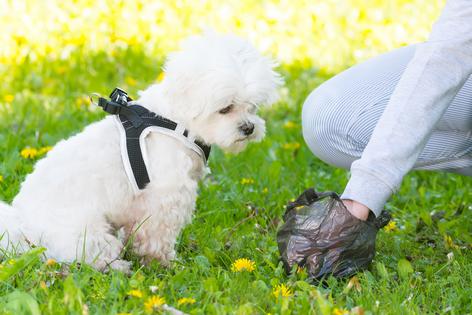My Pet World: Pet parents can manage a feisty, feces-eating dog in a few ways
Dear Cathy,
Sparky, our two-and-a-half-year-old Shih Tzu that we got at 12 weeks old has two behavioral problems. The first problem is his consistent aggression when in contact with strangers. He truly goes ballistic when anyone approaches the door, especially any uniformed delivery person. On occasion, I have picked him up to calm him, and his initial reaction is an attempt to bite me.
The second problem is his need to eat his feces. Since he has been verbally scolded and given time outs for doing this, he now tries to accomplish this by going upstairs when no one is around, defecating, and eating it. What do you recommend?
— Tom, Orlando Hills, Illinois
Dear Tom,
Dogs naturally lose their minds when a stranger comes to the door. All you can do is learn how to manage it when it happens. When Sparky “goes ballistic," he won’t hear your commands though. So, the first thing you need to do is get his attention by interrupting the behavior. Shake a can of coins or use a pet corrector, which makes a shhh sound to get his attention. You may only have a second to tell Sparky to “leave it.” Then call him to you, ask him to sit, and give him a treat.
Begin teaching Sparky the “leave it” command in easy settings where you are sure of his success. Then build on his successes over time by training him in increasingly distracting situations. The “leave it” command can be used for the obnoxious door behavior and the coprophagia (feces eating).
Here’s how to do it: Drop a treat to the ground and say, “leave it.” When Sparky “leaves it,” say his reward word and give him a treat. Then pick up the treat from the ground and begin again. Never let him eat the treat or anything else from the ground. When you want him to move away from the front door or a pile of poop, use the “leave it” command and call him to you for his treat.
You also can use your body to communicate what you expect. When Sparky’s at the front door, step in front of him, turn in the direction you want him to go, and point your arm over his head in that direction. Dogs respond well to this gesture.
If your dog has a clean bill of health, there are a few other things you can try for the coprophagia. Pick up your dog’s poop immediately upon his defecation. He can’t eat it if it’s not there. Sprinkle a small amount of meat tenderizer or add a few teaspoons of canned pumpkin (not the pie filling) to his food. There are also many over-the-counter stool-eating deterrents on the market these days. Try some of these products to see what works for Sparky. All of these things will make his feces taste bad – to him, which will help break the habit.
Dear Cathy,
I have a rescue dog that I got in October of 2013. I recently discovered that his gums cover most of his back and side teeth. I have tried many times to open his mouth with no luck. Before I take him to the vet, I have to give him two kinds of medications to calm him down so that the vet can examine him. What do I do? Would it be very expensive to have the skin removed from his teeth?
— Yvonne, Hartford, Connecticut
Dear Yvonne,
I am not a vet, but it sounds like your dog may have gingival hyperplasia, which is gum inflammation and enlargement. In severe cases, the gums can extend over his teeth as you describe. The condition can be throughout the mouth or localized in one area, almost looking like a tumor, so a trip to the vet is necessary to rule out oral cancer.
Gingival hyperplasia is thought to be a genetic disorder more common in boxers, bulldogs, and cocker spaniels, but it can occur in any breed of dog. Take your dog to a vet for a diagnosis and treatment plan. Your vet may recommend surgery to restore the gumlines, clean out and reduce deep pockets where bacteria can get trapped, and clean the plaque and tartar from your dog’s teeth.
I can’t tell you the cost, but I don’t imagine the surgery is cheap. But this oral condition can’t feel very good for your dog, and it can lead to increased tooth decay on down the road. Whether your dog has surgery or not, a vet needs to guide you on your dog’s unique dental care needs.
========
(Cathy M. Rosenthal is a longtime animal advocate, author, columnist and pet expert who has more than 25 years in the animal welfare field. Send your pet questions, stories and tips to cathy@petpundit.com. Please include your name, city, and state. You can follow her @cathymrosenthal.)
©2023 Tribune Content Agency, LLC.
(c) 2023 DISTRIBUTED BY TRIBUNE MEDIA SERVICES, INC.










